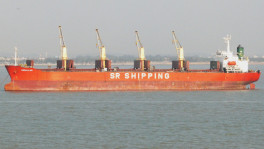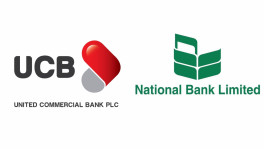Bangladesh’s cement industry booming
14 cement companies are involved in exporting their products. They have, in a number of instances, outstripped foreign companies in market competition.

Thirty years ago, Bangladesh would meet almost its entire demand for cement from abroad. Today, the picture is vastly different. Bangladesh's cement sector at this point in time is efficient and productive enough to contribute to the country's export basket – in large measure – after satisfying growing local demand.
MI Cement, the market leader in exports for cement in Bangladesh, had to produce an additional 10 lakh tonnes of cement to feed Bangladesh's major infrastructure projects, among which are the Padma Bridge, Rooppur Power Plant, the
Metro Rail and a flyover. Additionally, it has catered to the construction of a cricket stadium in India's north-eastern city of Agartala.
Fresh Cement,which was headed for a decline, experienced a turnaround when it won a deal to supply cement to the second Meghna-Gomti Bridge. Shah Cement, the market leader, meets the needs of the Matarbari Coal Power Plant.
Currently, 14 cement companies are involved in exporting their products. They have, in a number of instances, outstripped foreign companies in market competition.
In the 1990s, when the local market of cement was small, around 95 percent of demand was met through imports, according to data available from the Bangladesh Cement Manufacturers Association.

Demand, however, began to increase on the back of the government's big development projects and the expansion of private sector construction. As a result, local entrepreneurs have made big investments in the construction sector.
At present, 86 percent of the cement that the country needs is being produced locally.
Manwar Hossain, executive member of the Cement Manufacturers Association and managing director of Anwar Cement, told The Business Standard, "The local companies are supplying the lion's share of cement used in government and private infrastructure projects."
Cement market
In the last seven years, the production capacity of the local cement companies increased by 131 percent, while demand rose by 106 percent.
At the end of 2018, the production capacity stood at 5.80 crore tonnes, while the demand rose to as much as 3.10 crore tonnes.
Of the locally produced cement, the government uses 35 percent, commercial developers use 35 percent and individual-level small buyers use the rest.
From 2011 to 2018, the per capita use of cement increased by 97 percent to stand at 187kg. However, the country yet lags behind the world average of per capita use of 563kg.
Bangladesh is the 40th country in the world cement market now.

Masud Khan, former director of Lafarge Holcim Cement and also chief adviser of the MI Cement, said,"We have gas and power crises, which is why we cannot properly utilise our production capacity."
When asked about imports, Masud said some special varieties of cement were now being imported because of specific project demand. However, the amount is not very high.
The nationalized Chhatak Cement Factory exported cement in 2000 for the first time in the country's history. At present, there are 14 companies in the export pipeline.
In fiscal year 2017-18, cement worth around Tk100 crore was exported, which was 17 percent more than in the previous year.
Most of the cement exported from Bangladesh goes to India, especially to its northeastern states, according to industry insiders. Besides, Bangladeshi cement is also popular in Nepal, Sri Lanka and the Maldives.
MI Cement, the country's leading cement exporter, accounts for 50 percent of total exports.
Shah Cement, Bashundhara Cement, Fresh Cement, and Premier Cement are also contributing to the export of the construction material.

Six companies to raise production capacity
Meanwhile, six companies have invested an extra Tk3,000 crore in increasing their production capacity, according to sources.
Premier Cement alone has invested Tk700 crore to double its production capacity while Bashundhara Cement, Meghna Cement, Seven Rings Cement, MI Cement and Heidelberg Cement have begun boosting their capacity.
Kazi MdShafiqur Rahman, company secretary of Premier Cement, told The Business Standard,"We have set up Vertical Ruler Mill at Tk700 crore, which will enable us to manufacture more cement at lower cost and using less space."

Higher tax adds to retail price
As the price of gas has been increased for industrial use, producers now have to pay Tk10.7 per cubic metre. To use captive power, they have to pay Tk13.85 per unit.
Besides, 5 percent advance income tax and 5 percent advance tax have been imposed on the import of raw materials for cement production along with 15 percent VAT on the supply stage, raising the cost of production by about Tk50 per
bag cement.


 Keep updated, follow The Business Standard's Google news channel
Keep updated, follow The Business Standard's Google news channel
















